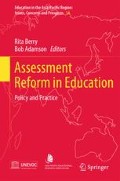Abstract
This article draws on existing research about feedback, and also on teachers’ perceptions of feedback, in order to throw light on the roles feedback can play in supporting learning within the classroom. It addresses the “common but puzzling observation that even when teachers provide students with valid and reliable judgements about the quality of their work, improvement does not necessarily follow” (Sadler, 1989). The article draws on a survey of 88 teachers as to how feedback becomes effective. The teachers were invited to complete the sentence, “Feedback becomes effective when…. ”. The article concludes that it is the social and personal aspects of feedback that may constitute the missing piece to Sadler’s (1989) puzzle: pupils are more likely to make constructive meaning out of feedback messages when teachers recognize the influence of social and personal aspects, as well as of the content and form, of feedback.
Access this chapter
Tax calculation will be finalised at checkout
Purchases are for personal use only
References
Allal, L., & Mottier Lopez, L. (2005). Formative assessment of learning: A review of publications in French. In J. Looney (Ed.), Formative assessment: Improving learning in secondary classrooms (pp. 241–264). Paris: OECD.
Askew, S., & Lodge, C. (2001). Gifts, ping-pong and loops – linking feedback to learning. In S. Askew (Ed.), Feedback for learning (pp. 1–18). London: Routledge.
Azevedo, R., & Bernard, R. (1995). A meta-analysis of the effects of feedback in computer-based instruction. Journal of Educational Computing Research, 13(2), 111–127.
Biggs, J., & Moore, P. (1993). The process of learning. Englewood Cliffs, NJ: Prentice Hall.
Black, P., & Wiliam, D. (1998). Assessment and classroom learning. Assessment in Education: principles, policy and practice, 5(1), 7–75.
Black, P., & Wiliam, D. (2006). Assessment for learning in the classroom. In J. Gardner (Ed.), Assessment and learning (pp. 9–25). London: Sage.
Boekaerts, M. (1993). Being concerned with well being and with learning. Educational Psychologist, 28(2), 149–167.
Boekaerts, M. (2006). Self-regulation and effort investment. In K. A. Renninger & I. E. Sigel (Eds.), Handbook of child psychology, Child psychology in practice (Vol. 4, 6th ed., pp. 345–377). New York: Wiley.
Butler, D., & Winne, P. (1995). Feedback and self-regulated learning. Review of Educational Research, 65(3), 245–281.
Dann, R. (2002). Promoting assessment as learning: Improving the learning process. London: RoutledgeFalmer.
Dennison, B., & Kirk, R. (1990). Do, review, learn, apply: A simple guide to experiential learning. Oxford: Blackwell.
Hargreaves, E., McCallum, B., & Gipps, C. (2000). Teacher feedback strategies in primary classrooms: New evidence. In S. Askew (Ed.), Feedback for learning (pp. 21–31). London: RoutledgeFalmer.
Hattie, J., & Timperley, H. (2007). The power of feedback. Review of Educational Research, 77(1), 81–112.
Henderlong, J., & Lepper, M. (2002). The effects of praise on children’s intrinsic motivation: A review and synthesis. Psychological Bulletin, 128(5), 774–795.
Kluger, A., & DeNisi, A. (1996). The effects of feedback interventions on performance: A historical review, a meta-analysis, and a preliminary feedback intervention theory. Psychological Bulletin, 119(2), 254–284.
Mason, B., & Bruning, R. (2001). Providing feedback in computer-based instruction: what the research tells us. Accessed July 22, 2010, from http://dwb4.unl.edu/dwb/Research/MB/MasonBruning.html
Mory, E. (2004). Feedback research review. In D. Jonassen (Ed.), Handbook of research on educational communications and technology (pp. 745–783). Mahwah, NJ: Erlbaum Associates.
Murnane, R., & Levy, F. (1996). Teaching the new basic skills. New York: Free Press.
Narciss, S., & Huth, K. (2004). How to design informative tutoring feedback for multi-media learning. In H. Niegemann, R. Brunken, & D. Leutner (Eds.), Instructional design for multimedia learning (pp. 181–195). Munster: Waxman.
Perrenoud, P. (1998). From formative evaluation to a controlled regulation of learning. Towards a wider conceptual field. Assessment in Education: Principles Policy and Practice, 5(1), 85–102.
Pollard, A. (1990). Towards a sociology of learning in primary school. British Journal of Sociology of Education, 11, 241–256.
Pryor, J., & Crossouard, B. (2008). A socio-cultural theorisation of formative assessment. Oxford Review of Education, 34(1), 1–20.
Pryor, J., & Torrance, H. (1998). Formative assessment in the classroom: Where psychological theory meets social practice. Social Psychology of Education, 2, 151–176.
Ryan, R., & Deci, E. (2000). Self-determination theory and the facilitation of intrinsic motivation, social development and well-being. American Psychologist, 55(1), 68–71.
Sadler, D. (1989). Formative assessment and the design of instructional systems. Instructional Science, 18, 119–144.
Shute, V. (2008). Focus on formative feedback. Review of Educational Research, 78(1), 153–189.
Stobart, G. (2008). Testing times: The uses and abuses of assessment. Abingdon: Routledge.
Torrance, H. (2007). Assessment as learning? How the use of explicit learning objectives, assessment criteria and feedback in post-secondary education and training can come to dominate learning. Assessment in Education, 14(3), 281–294.
Tunstall, P., & Gipps, C. (1996a). Teacher feedback to young children in formative assessment: A typology. British Educational Research Journal, 22(4), 389–404.
Tunstall, P., & Gipps, C. (1996b). ‘How does your teacher help you make your work better?’ Children’s understanding of formative assessment. Curriculum Journal, 7(2), 185–203.
Watkins, C. (2003). Learning: A sense-maker’s guide. London: ATL.
Wiliam, D. (2007). Keeping learning on track: Classroom assessment and the regulation of learning. In F. K. Lester, Jr. (Ed.), Second handbook of mathematics teaching and learning (pp. 1053–1098). Greenwich, CT: Information Age Publishing.
Acknowledgements
Many thanks are due to Professors David Scott, Gordon Stobart and Dylan Wiliam for their extremely helpful comments on earlier drafts of this chapter.
Author information
Authors and Affiliations
Corresponding author
Editor information
Editors and Affiliations
Rights and permissions
Copyright information
© 2011 Springer Science+Business Media B.V.
About this chapter
Cite this chapter
Hargreaves, E. (2011). Teachers’ Feedback to Pupils: “Like So Many Bottles Thrown Out to Sea”?. In: Berry, R., Adamson, B. (eds) Assessment Reform in Education. Education in the Asia-Pacific Region: Issues, Concerns and Prospects, vol 14. Springer, Dordrecht. https://doi.org/10.1007/978-94-007-0729-0_9
Download citation
DOI: https://doi.org/10.1007/978-94-007-0729-0_9
Published:
Publisher Name: Springer, Dordrecht
Print ISBN: 978-94-007-0728-3
Online ISBN: 978-94-007-0729-0
eBook Packages: Humanities, Social Sciences and LawEducation (R0)

